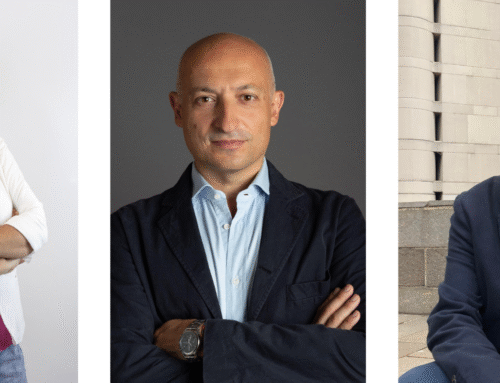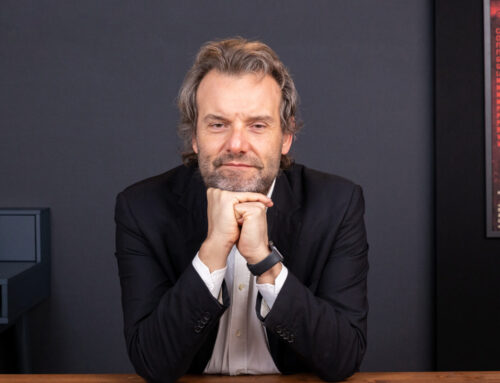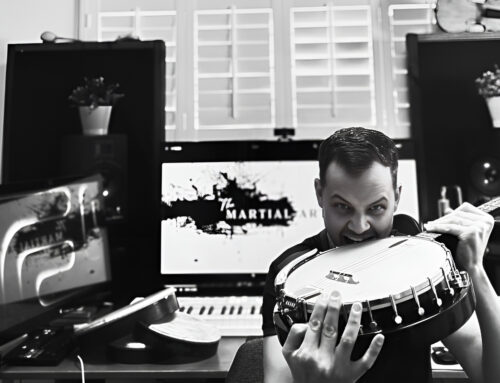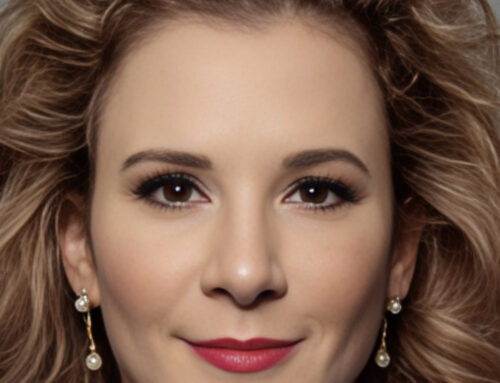In Conversation with Pietro Scalia
The Art of Editing Is Listening to the Story
Pietro Scalia is one of the most awarded and respected film editors in the international film industry.
Born in Sicily and raised in Switzerland, he trained in the United States, where he earned a Master’s degree in Film and Theatre Arts from UCLA. After starting his career alongside Oliver Stone, he became a go-to editor for some of the most visionary directors in contemporary cinema. From Ridley Scott — with whom he has cultivated a decades-long collaboration — to Bernardo Bertolucci, Sam Raimi, Michael Bay, and Gus Van Sant, Scalia has brought their creative visions to life, infusing the craft of editing with a renewed aesthetic and narrative depth.
A two-time Academy Award winner for JFK and Black Hawk Down, he has also received a BAFTA and multiple A.C.E. Awards. His work stands out for its balance between structural precision and visual dynamism, and for his ability to shape the rhythm of a film in harmony with the director’s poetic vision. Among the most emblematic titles in his career are Gladiator, The Martian, Hannibal, The Amazing Spider-Man 2, Ferrari, The Gray Man, Good Will Hunting (directed by Gus Van Sant), and Stealing Beauty (directed by Bernardo Bertolucci).
1. “Editing is the heart of cinema,” wrote Pudovkin. What does this statement mean to you today, after decades of experience and hundreds of hours of footage cut, moved, and transformed?
I fully agree. And I came to understand it through editing itself—it’s not something you know intuitively, but something you discover in the process. The “heart” refers to the emotional rhythm, the way a film breathes. It’s both the heart and the soul at the same time. It’s important to understand this because editing is incredibly powerful in creating emotion. Other art forms can do this too, but editing was born with cinema—it didn’t exist before. The language of editing is the very essence of cinema.
2. Your personal journey spans three very different cultural geographies: Sicily, Switzerland, and California. How have these roots shaped your perspective and influenced your editorial sensibility?
I grew up in the German-speaking part of Switzerland as the child of Italian immigrants — speaking both Italian and Swiss German. That bilingualism helped me develop a sensitivity to nuance. My parents also came from different regions: my father from Sicily, my mother from Puglia, so I was constantly immersed in contrasts — linguistic, cultural, emotional. That combination gave me both structure and passion.
My assistants often joke that I have the Swiss precision and Italian creativity — the ability to work with both hands and heart. Editing turned out to be the perfect synthesis of those traits. I didn’t set out to become an editor, but through my love of cinema and art, I found a path that felt right. I was also fortunate to receive support from the Swiss government, which awarded me a scholarship to study at one of the top U.S. film schools—UCLA. At 18, I made the decision to leave Switzerland. Embracing my roots has always been important to me. My dream was to return to Europe after gaining experience in the U.S., especially after making short films in school. I imagined myself working as a director in European cinema. But, eventually, I came back to Los Angeles because there was a lot of creative energy there at the time—the 1980s, the era of MTV, music videos, and the rise of American independent cinema, which offered real opportunities. When I returned to the U.S., I told myself: “If I want to become a director, I need to learn from the ones I admire — and the closest I could get to being near one was through the editing room.” In 1986, Oliver Stone’s Salvador came out, and I thought: this is the kind of cinema I love—socially driven, critical, based on true stories. Through Claire Simpson’s assistant — she had just won the Oscar for Platoon — I got an introduction. She told me to follow up after the shoot. I did, and she hired me as second assistant editor. That was my first job with Oliver Stone. I worked with him for six years, climbing step by step until I became editor on JFK — I was only 31.
3. You’ve worked with some of the most distinctive and influential directors in contemporary cinema, all with very different styles — from Stone to Scott, from Bertolucci to Van Sant. How do you approach a director’s language when starting to edit a film? What do you try to understand in order to enter their creative world?
The relationship between an editor and a director is very intimate. You’re guided by the material — the footage determines the possibilities. You can’t impose a style that’s not inherent to what was shot. What’s interesting is that Bertolucci’s cinema seems completely different from Stone’s. And yet, when I went from JFK to Little Buddha—the shift felt natural. Bertolucci was a cinephile and admired JFK tremendously. I remember feeling intimidated working with him after spending years in the U.S., where the system is very different. We were at the beginning of the shoot, in Kathmandu, and I remember watching dailies with the whole crew. I expected notes, but Bernardo [Bertolucci] said: “You have to discover the design. It’s already inside the footage.”
That moment was pivotal. Directors choose editors not just to assemble material, but to uncover the narrative structure and emotional resonance already present. Editing is about interpretation and discovery.
4. Editing a film also means “listening” to the story — to the characters, the emotions, the unspoken. Have you developed an instinct for the right timing of a scene, or do you follow a more technical method to decide where and how to cut?
There’s no single method. It’s about intuition. I never had a mentor — I discovered my instincts by working with footage. The question is always: when do you cut?
I observe how the image moves, how my eye reacts — and more importantly, how I feel. If an emotion feels genuine to me, I trust the audience will feel it too.
I’ll give you an example. In Stealing Beauty, there’s a moment when the wife walks away from her husband, and he leaves his hand in the air — holding a negative space. Bernardo preferred a second take, but I felt the first one was more powerful. It held emotional truth. It’s those subtle details — that feeling — which make the difference. Cinema is artificial, yes, but it becomes real when it moves you.
5. Artificial intelligence is making its way into post-production, offering new tools and automation. In your view, what role can — or should — AI play in an editor’s work? And what advice would you give a young editor navigating between AI and advanced software today? Where should they start in order to develop a truly authentic editorial voice?
There are already AI tools being used in post-production and visual effects today. They are powerful tools that can assist the process — especially in sound. For example, you might want to replicate an actor’s dialogue or voice, and AI can learn that voice and help recreate or alter certain lines. There are also tools that generate entirely new images that didn’t exist before, which can be useful — but they are not true creators.
AI can help generate ideas, narratives, or fictional stories, but it doesn’t create in the human sense. I don’t know if my own job is at risk — I see AI as potentially more disruptive for my assistants, who are involved in organizing systems and workflows. Because even if, in five or ten years, AI can do facial recognition or even interpret emotional cues, the real question is: how will it make editing choices? What criteria would it follow?
Editing choices are deeply personal. They are shaped by knowledge, by taste, by lived experience. That’s something I’m not sure AI will ever be able to replicate. If we lose that human element, we lose something essential.
6. You’re currently working on a project being filmed in Los Angeles — can you share a preview with us? At a time when the industry is producing 35% less content, how are you experiencing this slowdown?
Los Angeles has certainly been through a difficult period — first the pandemic, then the actors’ and writers’ strike, which brought the industry to a standstill for over six months. The impact is still being felt today; the recovery hasn’t been as strong as many had hoped. A lot of productions have moved abroad, where there are fewer union complications, as well as attractive tax incentives — either overseas or in other U.S. states like Georgia or New Mexico.
That’s why the fact that I just started working this week on a film produced by 20th Century Studios, shot in Los Angeles with post-production also happening here, is extremely rare. I’m truly happy about it and hope more productions will follow this example. So many people here need work. While there’s some activity in television, many film productions are being shot elsewhere.
I’m now working on the film produced by 20th Century Studios, based on the 2023 bestseller Whalefall by Daniel Kraus. The screenplay is written by Kraus and Brian Duffield, who also directs the film.
*Italy Meets Hollywood thanks Pietro Scalia for sharing his insights and experience and for his time.
Share:
The Art of Editing Is Listening to the Story
Pietro Scalia is one of the most awarded and respected film editors in the international film industry.
Born in Sicily and raised in Switzerland, he trained in the United States, where he earned a Master’s degree in Film and Theatre Arts from UCLA. After starting his career alongside Oliver Stone, he became a go-to editor for some of the most visionary directors in contemporary cinema. From Ridley Scott — with whom he has cultivated a decades-long collaboration — to Bernardo Bertolucci, Sam Raimi, Michael Bay, and Gus Van Sant, Scalia has brought their creative visions to life, infusing the craft of editing with a renewed aesthetic and narrative depth.
A two-time Academy Award winner for JFK and Black Hawk Down, he has also received a BAFTA and multiple A.C.E. Awards. His work stands out for its balance between structural precision and visual dynamism, and for his ability to shape the rhythm of a film in harmony with the director’s poetic vision. Among the most emblematic titles in his career are Gladiator, The Martian, Hannibal, The Amazing Spider-Man 2, Ferrari, The Gray Man, Good Will Hunting (directed by Gus Van Sant), and Stealing Beauty (directed by Bernardo Bertolucci).
1. “Editing is the heart of cinema,” wrote Pudovkin. What does this statement mean to you today, after decades of experience and hundreds of hours of footage cut, moved, and transformed?
I fully agree. And I came to understand it through editing itself—it’s not something you know intuitively, but something you discover in the process. The “heart” refers to the emotional rhythm, the way a film breathes. It’s both the heart and the soul at the same time. It’s important to understand this because editing is incredibly powerful in creating emotion. Other art forms can do this too, but editing was born with cinema—it didn’t exist before. The language of editing is the very essence of cinema.
2. Your personal journey spans three very different cultural geographies: Sicily, Switzerland, and California. How have these roots shaped your perspective and influenced your editorial sensibility?
I grew up in the German-speaking part of Switzerland as the child of Italian immigrants — speaking both Italian and Swiss German. That bilingualism helped me develop a sensitivity to nuance. My parents also came from different regions: my father from Sicily, my mother from Puglia, so I was constantly immersed in contrasts — linguistic, cultural, emotional. That combination gave me both structure and passion.
My assistants often joke that I have the Swiss precision and Italian creativity — the ability to work with both hands and heart. Editing turned out to be the perfect synthesis of those traits. I didn’t set out to become an editor, but through my love of cinema and art, I found a path that felt right. I was also fortunate to receive support from the Swiss government, which awarded me a scholarship to study at one of the top U.S. film schools—UCLA. At 18, I made the decision to leave Switzerland. Embracing my roots has always been important to me. My dream was to return to Europe after gaining experience in the U.S., especially after making short films in school. I imagined myself working as a director in European cinema. But, eventually, I came back to Los Angeles because there was a lot of creative energy there at the time—the 1980s, the era of MTV, music videos, and the rise of American independent cinema, which offered real opportunities. When I returned to the U.S., I told myself: “If I want to become a director, I need to learn from the ones I admire — and the closest I could get to being near one was through the editing room.” In 1986, Oliver Stone’s Salvador came out, and I thought: this is the kind of cinema I love—socially driven, critical, based on true stories. Through Claire Simpson’s assistant — she had just won the Oscar for Platoon — I got an introduction. She told me to follow up after the shoot. I did, and she hired me as second assistant editor. That was my first job with Oliver Stone. I worked with him for six years, climbing step by step until I became editor on JFK — I was only 31.
3. You’ve worked with some of the most distinctive and influential directors in contemporary cinema, all with very different styles — from Stone to Scott, from Bertolucci to Van Sant. How do you approach a director’s language when starting to edit a film? What do you try to understand in order to enter their creative world?
The relationship between an editor and a director is very intimate. You’re guided by the material — the footage determines the possibilities. You can’t impose a style that’s not inherent to what was shot. What’s interesting is that Bertolucci’s cinema seems completely different from Stone’s. And yet, when I went from JFK to Little Buddha—the shift felt natural. Bertolucci was a cinephile and admired JFK tremendously. I remember feeling intimidated working with him after spending years in the U.S., where the system is very different. We were at the beginning of the shoot, in Kathmandu, and I remember watching dailies with the whole crew. I expected notes, but Bernardo [Bertolucci] said: “You have to discover the design. It’s already inside the footage.”
That moment was pivotal. Directors choose editors not just to assemble material, but to uncover the narrative structure and emotional resonance already present. Editing is about interpretation and discovery.
4. Editing a film also means “listening” to the story — to the characters, the emotions, the unspoken. Have you developed an instinct for the right timing of a scene, or do you follow a more technical method to decide where and how to cut?
There’s no single method. It’s about intuition. I never had a mentor — I discovered my instincts by working with footage. The question is always: when do you cut?
I observe how the image moves, how my eye reacts — and more importantly, how I feel. If an emotion feels genuine to me, I trust the audience will feel it too.
I’ll give you an example. In Stealing Beauty, there’s a moment when the wife walks away from her husband, and he leaves his hand in the air — holding a negative space. Bernardo preferred a second take, but I felt the first one was more powerful. It held emotional truth. It’s those subtle details — that feeling — which make the difference. Cinema is artificial, yes, but it becomes real when it moves you.
5. Artificial intelligence is making its way into post-production, offering new tools and automation. In your view, what role can — or should — AI play in an editor’s work? And what advice would you give a young editor navigating between AI and advanced software today? Where should they start in order to develop a truly authentic editorial voice?
There are already AI tools being used in post-production and visual effects today. They are powerful tools that can assist the process — especially in sound. For example, you might want to replicate an actor’s dialogue or voice, and AI can learn that voice and help recreate or alter certain lines. There are also tools that generate entirely new images that didn’t exist before, which can be useful — but they are not true creators.
AI can help generate ideas, narratives, or fictional stories, but it doesn’t create in the human sense. I don’t know if my own job is at risk — I see AI as potentially more disruptive for my assistants, who are involved in organizing systems and workflows. Because even if, in five or ten years, AI can do facial recognition or even interpret emotional cues, the real question is: how will it make editing choices? What criteria would it follow?
Editing choices are deeply personal. They are shaped by knowledge, by taste, by lived experience. That’s something I’m not sure AI will ever be able to replicate. If we lose that human element, we lose something essential.
6. You’re currently working on a project being filmed in Los Angeles — can you share a preview with us? At a time when the industry is producing 35% less content, how are you experiencing this slowdown?
Los Angeles has certainly been through a difficult period — first the pandemic, then the actors’ and writers’ strike, which brought the industry to a standstill for over six months. The impact is still being felt today; the recovery hasn’t been as strong as many had hoped. A lot of productions have moved abroad, where there are fewer union complications, as well as attractive tax incentives — either overseas or in other U.S. states like Georgia or New Mexico.
That’s why the fact that I just started working this week on a film produced by 20th Century Studios, shot in Los Angeles with post-production also happening here, is extremely rare. I’m truly happy about it and hope more productions will follow this example. So many people here need work. While there’s some activity in television, many film productions are being shot elsewhere.
I’m now working on the film produced by 20th Century Studios, based on the 2023 bestseller Whalefall by Daniel Kraus. The screenplay is written by Kraus and Brian Duffield, who also directs the film.
*Italy Meets Hollywood thanks Pietro Scalia for sharing his insights and experience and for his time.








